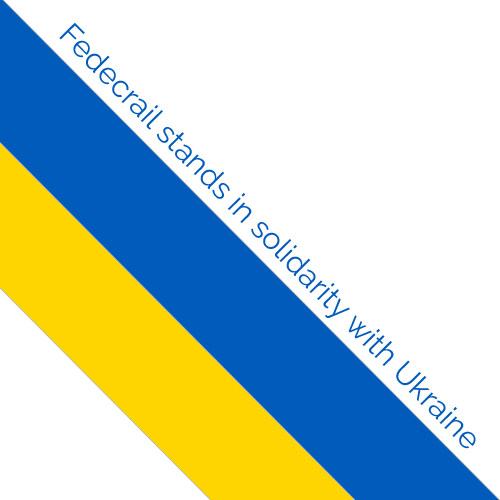Fedecrail Environmental Policy paper, part of the Fedecrail Strategic Plan 2017 – 2022.
1. (Mobile) Heritage in a changing world.
Generally spoken we can conclude that the social feeling about the environment in relation to the future of our planet has changed a lot in the last quarter of the century. In the end of 2015 this change became clear in the Paris climate conference, where a new international climate agreement as this change was presented. In the meantime many countries signed this contract in which strong arrangements are agreed about bringing back the CO2 output in the world to slow down the global warming. (See the attachment for a summary of information about the results of the Paris Climate Conference)
2. Smoke, smell and sounds.
Carbon dioxide (CO2) is the result of combustion of more or less all the traditional fuels like wood, oil, gas and coal. Most of the Fedecrail members and their adherents, are using oil and coal as the traditional fuel. Some 40 years ago a locomotive driver was praised when he and his engine made nice plumes of smoke when seeing photographers along his railway. Nowadays people are complaining about smoke, about dirt and the smell and yes about the danger of using coal (particulates). An old diesel-locomotive that makes much noise and is producing a lot of smoke and diesel smell is not longer really appreciated. In some cities the local authorities are organising environmental zones, in which old busses, old cars, old motorcycles etc. are not allowed nowadays to take part in the day to day traffic, or even stronger are not tolerated at all any longer.
3. Retaining conceptual authenticity of mobile heritage as cultural and educational value.
These traditional fuel is the base of the conceptual authenticity of the preserved railway objects like steam- and diesel locomotives, and the operational processes who were so characteristic for there being. This preserving process inclusive COAL, should make it clear that we see it as our right to burn the traditional fuels like coal and oil. Fedecrail first objectives in this case should be, to put together an overall plan, to create a base for a long term mutual interest between the people of the heritage railway world and the politicians who are involved in creating a better environmental climate to give generations after us the chance to live a good live on earth. In this plan the cultural and educational values should be retained to tell the exceptional story, that makes mobile heritage in general and particular preserved railways in their authentic form into a sincere, instructive and attractive product. In that form it will educate a great amount of people all over the world, varying from youngsters to elderly people, about our world during the period of the traditional industrialization and what it has brought mankind and why it has to be transformed in our modern, green and energy neutral world
4. Elements to be developed for the an overall plan to create a mutual interest.
A. Fedecrail has to formulate clear goals, together with her Members and their adherents.
B. Where possible Fedecrail should form a united front with other organisations active in the mobile and industrial heritage.
C. Fedecrail should gather as much as possible relevant data, about the different fields in which the world of heritage railways is active:
- Social economic
- Cultural
- Technical
- – FEDECRAIL should marshal and publicise the arguments supporting the use by its members and their adherents of traditional fuels such as coal and oil and, in particular, explaining the context of such use being a minimal contributor to noxious emissions.
- – The use of fuel
- – To find ways of reduction of output of CO2, fine particles and other noxious emissions, inclusive the retaining of the conceptual authenticity of the involved objects and connected operational processes. This can be part of the educational product.
- – Convince political partners of the fact that the output made in our sector is minimal so that our sector only contributes to a minimal proportion of global output.
- – Looking into alternative ways of reducing emissions
- Networking
- – Politically
- – Touristic
- – Educational
- – Human Resource Management
- – Other participants in the mobile heritage world
- – Other participants in the industrial heritage world
- Communication & tools
- – Internal
- – Corporate
- – Public Affairs
- – International
- – Media
5. Some examples to find an integrated route, for heritage railways as a part of mobile heritage in general to the 22nd century.
A. Cultural value of rail related heritage as instrument for long term preservation as working objects.
In some countries like France, Germany, the United Kingdom and the Netherlands, the cultural value of mobile heritage is recognized as so important, and especially the conceptual authenticity, that they are protected by law, like the listed buildings. It would be a Fedecrail task to realise a understandable system like this on a European scale.
Instruments:
- a. The RIGA Charter
- b. Forming of a connection between other forms of mobile heritage, like historic ships, road-vehicles and airplanes (a European Mobile Collection).
- c. Looking for joint effort in cultural fields that are longer accepted in the world of cultural heritage, like the immovable heritage (buildings), or art (paintings etc.) in the Museums.
- d. Learning from the Museums united in the ICOM (International Conference of Museums), mobile heritage organisations should reform into permanent institutions in the service of society and its development, open to the public, which acquires, conserves, researches, communicates and exhibits the mobile heritage and its environment for the purposes of education, study and enjoyment. Many Museums are a highly successful tourist attraction nowadays and could be a useful pattern for mobile heritage organizations.
B. Fedecrail should choose their partners in this process very carefully. It is important to realise in this case, that, while the sector’s output of CO2, fine particles and other noxious emissions is in global perspective miniscule, the size of the problems to be solved are huge, because:
- the results of the Paris climate conference are transcending the European borders.
- The main platform to discuss the climate question at hand is the United Nation UNFCCC platform (United Framework Convention on Climate Change).
- On the other hand the EU has decided to be a leading partner in this long term process.
It is important to seek structural collaboration in a most effective way between Fedecrail and (par example):
- Our Members and
- Their members (adherents)
- EU politicians (in the fields of Culture, Tourism, transport and environment)
- Europa Nostra
- The Wattrain organisation
- The other regional umbrella organisation for Asia, Africa, Australia, America
- The private sector in environment, transport and Culture
- Etc, etc…..
As long as there are common interests that will give real chances for realistic results.
C. Try to find ways to produce a real reduction of output, but retain the conceptual authenticity.
Instruments:
- a. Techniques developed by Waller. (For the more touristic orientated organisations);
- – electrical pre-heating system
- – better isolation of boiler (savings in rest warmth)
- – Using different fuel
- b. Make better and process-controlled boiler-water. Softening and desalting will economise between 15-25% on coal/fuel use, minimalize the need for boiler-washouts and increase boiler lifetime;
- c. Try to catch the rest warmth of the hours heating the boiler after lighting up until start to run the engine, and use that rest warmth without the CO2 for heating the buildings and the facilities the railway is using for their own operations. If keeping the locomotive in steam inclusive a fire on, during the non-use moments, you could do same.
- d. www.csrail.org (USA) , White paper programme.
- * Use of Lempor exhausts
- * Firing with Torrefied Biomass
- e. Looking for the best type of coal, with as results less smoke and less complaints. Mostly less residual waste (reduction of operational costs)
- f. Better training of staff, in theory and practically and make a good day to day operational experience to a qualitative professional level.
D. The image of Fedecrail as important partner in this complex but foremost important process.
- Fedecrail should aim on a qualitative professional image in the fields we are active;
- Fedecrail should be as transparent as possible to their members and their adherents in the development of the strategy that can be realistic in the goals to achieve.
- After the decision is made for the strategic goals in this process, every organisation in between Fedecrail should be informed and “sing the same song” as much as possible.
- The Members and their adherents are also the “eyes and ears” of the heritage railway world. During the process there should be a simple network developed via which unknown or unexpected reactions/news should be sent to the negotiators and vice versa.
The Policy Document “Plan Paris” has been developed (as other future Policy Documents will be as well) to achieve the strategic objectives, formulated in the strategic plan 2017 – 2022, to the maximum and agreed by the Fedecrail AGM at May 5th 2017.
6. Financing.
To complete this “Plan Paris”, there should be added a chapter about financing (chapter 6), which will be incorporated within the yearly budgets of the organisation. In the budget it should clear who is responsible finding the funds and for spending the budgeted money to the right amount and moment.
7. Timetable
Also there should be added a chapter about the timetable for running this project. It also indicates the moments of which should be clear, that the necessary financial resources should be available. If these financial resources are not (or not completely) available, the council has to decide to go on or not, or with what alteration the project will be continued.
ATTACHMENT
CLIMATE CONFERENCE PARIS 2015 (COP21) IN HEADLINES
- The 21st annual climate-conference, COP21, of the United Nations was held in Paris from November 30th to December 12th 2015.
- COP means Conference of Parties.
- All parties involved in UNFCCC (the climate treaty of the UN) took part.
- Parties agreed to reduce the greenhouse effect and
- The global warming to the 1.5 degree as target value.
- At the end of September 2016 the Treaty was signed by the EU Ministers involved.
- In October 2016 the European Parliament signed the treaty.
- From November 4th 2016 the new climate treaty is formally active.
Headlines of the results of the Paris Climate Conference
- The treaty comes into force as it is signed by at least 55 states, together responsible for at least 55% of the CO2 exhaust.
- The main goal of the treaty is to reduce the growth of the greenhouse effect so that around 2050 there should be a balance betweenthe exhaust of greenhouse effect and the absorbing-power of nature.
- Around 2100 the worldwide growth of temperature should be reduced to 2 degrees C, compared with the level before the start of the industrial revolution.
- Every 5 year the climate policy of all countries will be evaluated. The first control in 2023.
- The rich countries should support the developing countries in realising the treaty goals. Every year there should be € 91 billion available.
Goals for the EU.
- The EU wanted to be one of the leading parties in the process.
- Bigger West-European countries wanted to make a statement, that the exhaust of CO2 should be reduced, by 40 % compared with 1992 in 2030.
- The EU parliament decided that from 2030 30 % of the used energy should be carbon-neutral.
- The treaty should last for 5 years.
The next conference will be in 2018.


